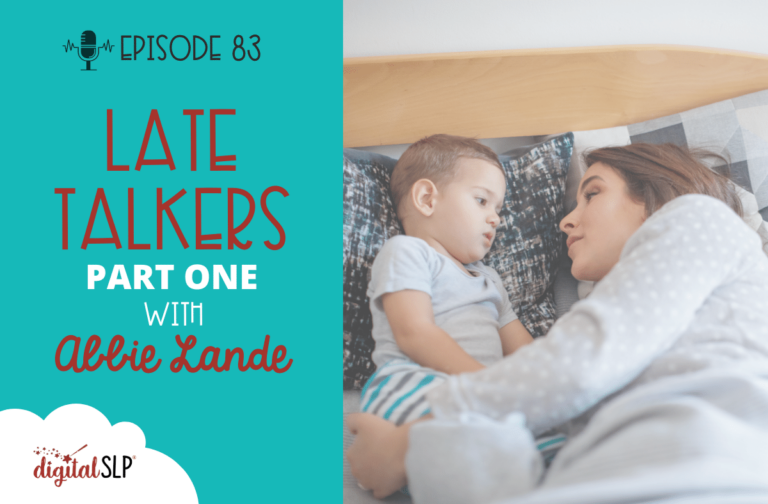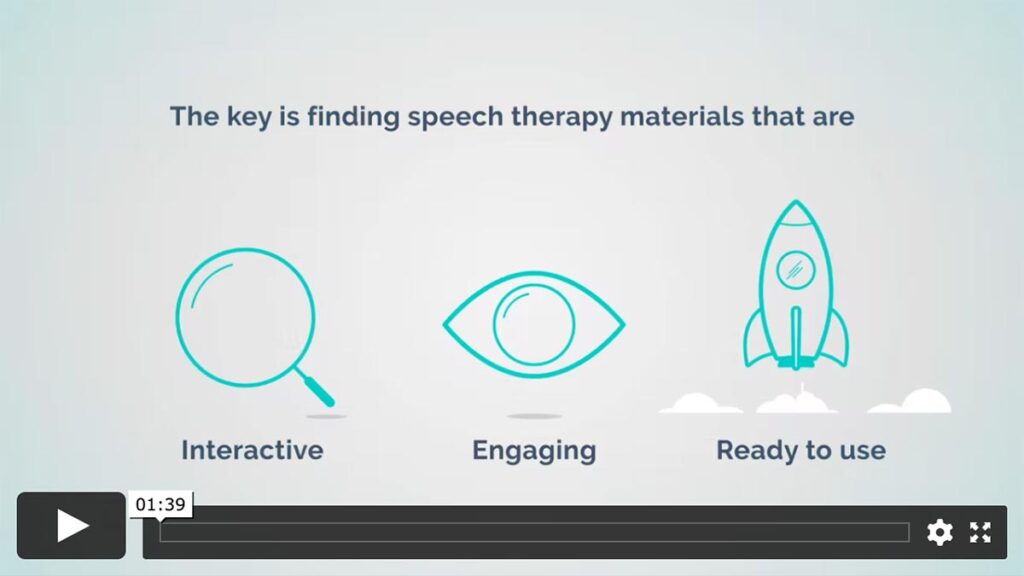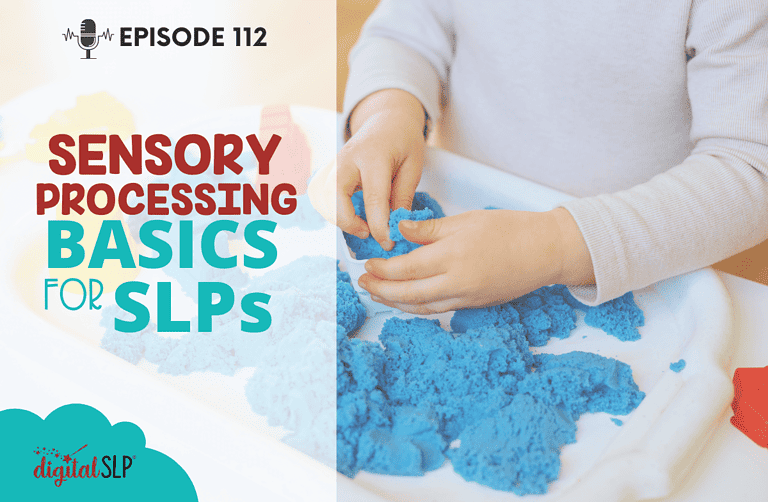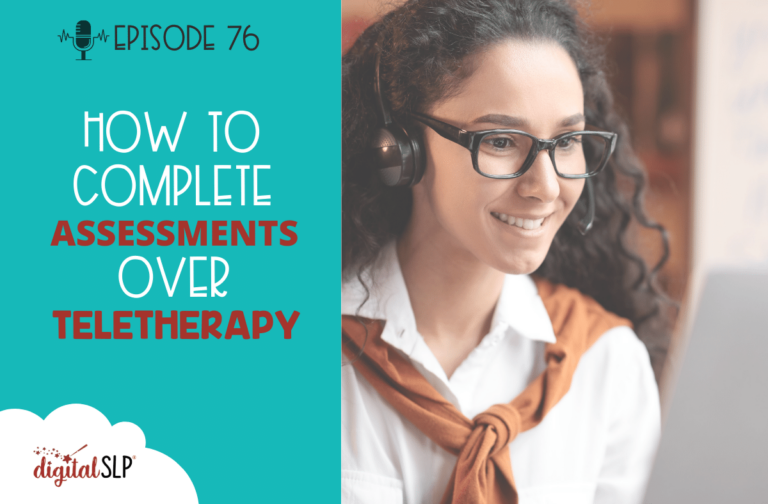Who exactly is a late talker? How can you tell if your new potential client needs speech therapy, or if he/she will catch up to their peers? Tune in to this episode as I chat with guest speaker, Abbie Lande, about late talkers and when to move forward with speech therapy.
Who is a late talker?
- A child that is 18-30 months of age who seems to understand the language well but does not talk or say words as much as expected for a child that age.
- Usually developing well in other areas (play skills, social skills, receptive language).
How many words should my child have? Wide range of normal!
- 12 months: 2-6 (first word)
- 15 months: 10
- 18 months: 50
- 24 months: 200-300 (some 2-word combinations)
- 30 months: 450
- 36 months: 1000
Do late talkers grow out of it?
Two Paths for Late Talkers
Research shows late talkers seem to follow one of two paths:
Path #1:
Path #2:
Late talkers who catch up and still have some challenges in:
- Language and literacy skills: vocabulary, grammar, phonology, reading, understanding language, and writing.
- Other language-related skills: social skills, behavior, executive function (planning, organizing, etc.)
- How the brain processes speech: don’t process speech they hear as easily as other children – less developed speech processing skills
Wait and see?
NO! The earlier that therapy is started, the better.
Signs that your child is less likely to catch up without speech therapy services:
- Limited babbling as an infant
- History of persistent ear infections
- The child does not imitate words
- The child has a small number of consonant sounds (m, p, b, etc.)
- The child uses few gestures to communicate
- The child demonstrates poor play and social skills – such as difficulty engaging with peers during play and/or difficulty with pretend play
- The child does not understand directions or language used – comprehension delay*If these signs are still present around 18 months of age, recommend consulting with a speech-language pathologist.
- Many pediatricians “wait and see” approach”
-
-
- Call a Speech-Language Pathologist! Go with your parental gut.
- An SLP will be able to evaluate and provide recommendations on what to work on at home, etc.
- Avoid the “wait and see” approach – if the child does not qualify for services, you can always evaluate again later.
-
Links & Resources
Full Transcript of Podcast: Late Talkers – Part One with Abbie Lande
Episode 83 - Late Talkers: Part One with Abbie Lande
Jessica: You're listening to the Speech Space Podcast, a podcast full of tips and resources for SLPs. I'm your host, Jessica Cassity, and this is Episode 83. Hey there, everybody! I'm so excited to bring on a special guest, Abbie Lande. She's actually a member of The Digital SLP team, and we're going to bring her on today to talk all about late talkers. And we actually had so much good stuff to say that we split this into two episodes. So this is part one of two. But before we get started, I did want to mention that this podcast is brought to you by The Digital SLP membership site, which is a site that features time-saving interactive digital resources that are all teletherapy platform-friendly. You can learn more or sign up for a free trial by heading to thedigitalslp.com/digitalslp. Hey Abbie, thank you so much for coming on the show today.
Abbie: Hi Jessica. Thanks for having me.
Jessica: So I know we are going to be talking about late talkers, but before we do that, can you take a minute to go ahead and tell our listeners a little bit about you?
Abbie: Yeah! So my name is Abbie Lande and I'm a speech therapist based out of Indianapolis, Indiana, and I have been practicing for about seven years and I have worked in a variety of settings, including preschools, elementary schools, pediatric hospitals. And now I currently own my own private practice called Upward Speech Therapy in Indianapolis.
Jessica: Nice, and how long have you been doing the private practice?
Abbie: So I started about two weeks before the total shutdown in 2020. So a little bit over a year now, but yeah, it's been great.
Jessica: Okay. Now what trends, if any, are you seeing in your business, post-everything that's been happening in the world?
Abbie: Yep, so I started pretty much all virtual for almost a full year. So it started relatively slowly and then I found Clinic Space. I've been sharing space with a couple of physical therapists that I met along the way and slowly I've kind of, I have like a mix now, half teletherapy and half in the clinic. And I feel like more recently I've had a lot of clients coming back to teletherapy, just with everything getting a little bit crazy. Yeah, again, but yeah, I've been working a lot with kind of the little ones and yeah.
Jessica: Yeah. Great. Great. And you also are very a valuable member of The Digital SLP team.
Abbie: Yes, I love it!
Jessica: All right. So let's talk about late talkers. I think this is something that comes up, you know, so much. I feel like I'm always having friends with little ones asking me questions. So I think this is going to be a really helpful episode. So let's start off by defining what a late talker is. So what, what exactly is a late talker?
Abbie: So a late talker is a child anywhere between around 18 months to 30 months. And typically you'll see good language skills like receptive language skills. Usually you'll see good social skills and play skills. And the one area that they're having trouble with is just that they're not speaking yet. And so for these kiddos, I would say typically first word comes around 12 months. And if the child's around 18 to 30 months and they're still not using that two to six words, that's pretty much a late talker.
Jessica: Okay. Now, true confession here as a mom. Are you ever secretly assessing your friends' kids?
Abbie: So I have, well as of today, a 21-month-old at home. So I'm constantly assessing her. I feel like just subconsciously, but yes, I feel like when I see kids. It's so hard because these, this age range, kids develop such different rates. And so I'll see, you know, my daughter will be at a play date with another little 18-month-old and they just vary so much in their skills. So I'm constantly kind of still, since I work a lot with children who have delays, it's hard to see, you know, what is the typical rate of developing and what is a true late talker and when should children seek out for speech therapy. But yes, I am secretly, constantly just kind of observing and seeing, you know, what trends am I seeing in these children.
Jessica: Right, yeah. It's I find that it's really hard to turn off. And then when I get a question, especially if it's a child that I don't see regularly, I'm always trying not to say, I don't want to say too much where it sounds scary. Like maybe there's a problem because it's hard to know when you don't see them, but I also want to kind of empower them to go and seek an evaluation. But I think the biggest things that I usually ask when I'm just curious from afar is, you know, are they showing communicative intent? Like, are they pointing to things or getting frustrated or showing that they want to communicate. And then receptive language is the other one too, is, you know, are they understanding all that you're saying, because I think what those two pieces of information, it can kind of give you a good idea of whether that child needs to go, you know, get an assessment depending on their age, of course. And of course there's so much more that goes into it, but I'm just saying, whenever someone says, hey, this is my situation. Those are my two kind of big questions. And then of course I'm always in favor of getting an evaluation because there's no harm that's going to come from that, you know?
Abbie: And I feel like I have a lot of people I know, will say they'll call me and be like, my child's not talking. And what I find a lot of parents don't realize is talking can be signs, talking can be those gestures, talking can be, you know, those environmental sounds like beep beep or vroom. And so when I then dive down with the parents and ask, okay, let's go back. What words is your child using? They're like, oh, they are actually using maybe 10 words. It's just through gestures or signs. So I think that's a big point that's helpful for parents to recognize.
Jessica: Right, right. Yeah, absolutely. Now let's talk about words because I know that's another question and I know it's hard for moms, especially, because you might compare, you know, if your child's hanging out with another child, that's the same age, you know, their language skills can be so varied. You know, one might be saying two words, one might be saying 50 words and it's hard not to compare. So, you know, can you talk a little bit about that?
Abbie: Yeah. So I feel like in those beginning stages, those first words, you know, you're always thinking about the mama and dada, and those early gestures of pointing to things that they're wanting. And I feel like when, you know, as you were saying, when there are two kids together and you're looking at the difference of their words and development, you know, usually around one, you're looking for about two to six words and then as they get closer to one and a half, you're thinking more towards 50. And then of course we all think of the two word combinations when kids turn two. But it's more so what I have seen with the kids that I work with, looking at both the number of words that they have, but more so the intention behind those words and how they're communicating those words. You know, if they have two to six words, but they're doing tons of signs, kind of like I was saying before, and they're gesturing and communicating their thoughts and ideas, then I wouldn't be as worried than compared to those kids who have maybe two words, but they're not very meaningful and they're not gesturing and they're not using signs. I think it just depends on the types of words they're using and how they're getting those words across.
Jessica: Yeah, that makes a lot of sense because, you know, we do have these kinds of ranges, you know, that you were talking about, but there is such a wide range of normal. So it's important to keep that in mind. I actually had a post a while ago that there was a lot of commentary on, because it said something to the extent that like your child should have 200 words by the time they're two, which of course is not an absolute rule, but it was just suggesting that if that milestone hadn't been met, then you might want to consider an evaluation. And a lot of people are really upset at that. Primarily parents, because of course, as we know, not everyone is going to have 200 words by age two. Some will and some won't and some, for some, that's a red flag and for others, that's just their variation of normal. So, so yeah, whenever that post went up, I had no idea how, how much, how many shares... yes, yes.
Abbie: That's right... I recently made a post, I've been doing posts just very general on my business page. At 12 months, this is what you see, at 18 months, this is what you'll see with just like five characteristics. And I was in a session and one of the parents was explaining, oh, I went through that whole checklist. And there was one thing on that checklist that she's not showing. And I was like, oh wow! Parents really take like every single thing. And that one little characteristic that, that child wasn't showing wasn't a big deal. But to that parent, you know, she saw that whole checklist and wanted to make sure that her kid was doing all those things. So I think a big piece is the education with this population and making sure that parents understand there's such a wide range and it's okay if your child isn't showing every single thing on that checklist.
Jessica: Absolutely, and you know, I've got to give credit to those parents because good for them for doing their research and really trying to look at the information that's out there. But yeah, I think it is important to balance that with professional advice as well. So then, you know, you can be informed. And I know me as a mom, it's so easy to see something and get carried away like, oh, well they're not doing that. Or maybe they should be, or, you know, it's nice to have that balance with some professional advice as well. Yeah. Okay. So let's talk about growing out of late talking. So this is something that I know that SLP sometimes struggle with, with pediatricians where mom and dad will kind of have a gut feeling that possibly there's some delayed speech happening and we'll bring that to their pediatrician. I know this happens with stuttering a lot as well, and they say, well, they're going to grow out of it. They're probably going to grow out of it. And of course we know sometimes that is true, but let's talk about growing out of it. You know, how often does that happen and what does that look like?
Abbie: Well, first and foremost, I always say kind of what you mentioned before. If a parent has a gut feeling, always go with it. If a therapist has a gut feeling, always go with it. There's no harm in therapy, there's only benefit. And if a child ends up not needing the therapy, then that's great and you can always reevaluate. But if you ever do have that gut feeling, never wait and see. My biggest advice is to reach out to a speech therapist and see if there's anything that's needed for the child. But usually with late talkers, the research has shown there's typically two paths with growing out of it. So there's that one path where about 70% to 80% of late talkers seem to catch up to their peers when they're entering school. And then there's that other path where about 20% to 30% of late talkers, don't grow out of it and you'll start to see language delay. But a big thing to recognize is even those late talkers who do seem to catch up to their peers, they typically will show some signs and some challenges in the future of having language difficulties, whether that's with vocabulary or reading, writing, comprehension. Typically you will see some of these kids who catch up to their peers have some of these difficulties. So when you are working with late talkers, just being able to recognize that even if some of these kids are going to catch up, they may still have language delays in the future. So giving them some of that support early on is always going to be the best route to take.
Jessica: Gotcha, gotcha. All right. So let's go ahead and talk about some signs that your child is less likely to catch up without receiving any sort of speech therapy intervention.
Abbie: Yeah. So usually what you would be looking for is if a parent is explaining that their child showed limited babbling when they were an infant. That's typically a sign that these children are showing signs of late talking. Another sign might be history of persistent ear infections. If the child's not imitating words, or if you're seeing a smaller number of consonant sounds. So sometimes with a lot of the kids that I worked with, I hear a lot of vowels and a lot of pointing with the ah ah ah, but not a ton of those early consonant sounds. So that could be a sign. Another sign might be a child using few gestures when they're communicating or sometimes some poor play skills and social skills. So maybe some poor pretend play. And then another sign might be a comprehension delay. So if they're receptive language skills are a little bit delayed. Any of those signs, I would say, seeking out for speech therapy services would be a good idea.
Jessica: Okay. Gotcha. And I know we touched a little bit on the pediatricians with the wait-and-see approach. Is that something that you hear about often?
Abbie: This is something I hear about often and it's not every pediatrician, but I do have a handful of clients where the parents still came to me, even though the pediatrician recommended to wait since they were younger. And the parent just came anyway because of their gut feeling. And, you know, I always just explain if we do the evaluation and your child doesn't qualify, then we can always reevaluate at another time. But if a parent walks in the door with any gut feeling, I always feel best route is to do that evaluation.
Jessica: Yeah. I really agree with that. I think that, you know, parents are seeing those children each and every day and their intuition is often very, very valuable. Okay. So if you're a parent, and you're concerned that your child should be using more words, what is your best advice for those parents?
Abbie: Yeah, so my best advice is to reach out to a speech-language pathologist, you know, speech pathologists have the education and the knowledge of, you know, what recommendations we can give these parents and what they can work on at home. And a lot of what I see with this population is parent education. You know, the parents just need a little bit of coaching and support of how can I further help my child to use those words. So coming and having that first evaluation and getting those recommendations is my biggest advice for parents. So one example that I have is one of the kiddos that I've been working with, mom reached out to me when she was around 12 months old, which is pretty young for starting therapy because usually we don't start till closer to 18 months. But mom was extremely concerned because she has an older sibling who has a rare genetic disorder. And mom started seeing some of the same characteristics in her younger child that she saw with the older sibling. So she reached out very nervous, wanting advice. And, you know, I explained to mom, I am more than welcome to do that evaluation. It is a little bit earlier than I would ever recommend, but you're the parent. You have that gut feeling, I'll leave that up to you. And so we did that evaluation and I'm still working with this child today and she's now around 22 months and she's doing great. But, you know, it was a great call on mom just to follow that instinct. And yes, she was young and mom understood that, you know, maybe it's not needed right now, but just to help her feel a little bit better and to get that coaching, to figure out how can I best help my child is a great example of just going with that parental instinct.
Jessica: Yeah, absolutely. I love that. I think that's, that's so important and I've really heard a lot from, and not to bad mouth pediatricians because there are so many amazing pediatricians, but I do feel like some of them have an outdated philosophy. And I hear a lot from parents like I just knew something was different. I knew something was wrong or I, you know, and then they kind of don't listen to the recommendation, which I applaud them for doing. When the pediatrician says, no, just wait and see. And then, you know, they're like, well, I'm going to go get this evaluation anyway. I think, you know, it's not, it's a little different, you know, than something that like a medication or something that's invasive, where of course you want to wait and see if, you know, there's a chance that you might not need it, but for something like therapy where there's really no risk it's hard to justify waiting whenever we know it can be so beneficial.
Abbie: Yep. I definitely agree.
Jessica: Yeah. All right. So let's wrap up there. And then on the next episode, we'll hop back on and we will be talking about therapy strategies for late talkers. So thank you so much for joining me today, Abbie, and I will talk to you again soon.
Abbie: Thank you for having me.
Jessica: Thank you so much for tuning in today. We will be back on our next episode with Abbie again, to talk all about doing therapy when working with late talkers. So I hope that you can tune in to join us and thank you so much for tuning in today.













Recent Comments